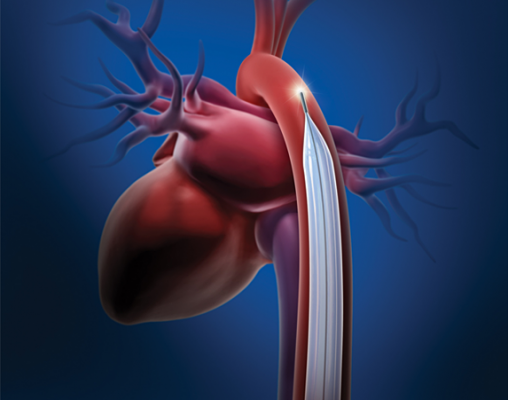
September 10, 2012 — Maquet Cardiovascular LLC announced 30-day results from the large, randomized, multicenter intra-aortic balloon pump (IABP)-SHOCK II clinical trial in patients with acute myocardial infarction (AMI) who were in cardiogenic shock and undergoing early revascularization. The findings showed that use of intra-aortic balloon counter-pulsation (IABC) therapy was associated with an observed improvement in all-cause mortality at 30 days, but the trial did not meet the pre-specified 12 percent improvement in survival endpoint compared with standard medical therapy. In the trial, IABC therapy was shown to be safe without any increase in complications compared to the control group. The findings were presented in the Hot Line II: Late-Breaking Trials on Interventions session during the 2012 European Society of Cardiology (ESC) Congress in Munich, Germany.
"Patients in cardiogenic shock are critically ill and require aggressive treatment measures," said Marc Cohen, M.D., chief of the division of cardiology at Newark Beth Israel Medical Center in Newark, N.J., and professor of medicine at the Mount Sinai School of Medicine in New York. "The results of the SHOCK II trial demonstrated unparalleled safety with IABC therapy in this patient population, and I believe it would be premature, without further exploration of the data, to determine which patients are best served with IABC therapy.
"Previous clinical trials in other patient populations, including those undergoing high-risk percutaneous coronary intervention [PCI], have shown that the benefits of IABC therapy can be seen beyond 30 days. It is important that we wait and assess the six-month and 12-month mortality data from IABP-SHOCK II before making definitive conclusions about the use of IABC therapy in cardiogenic shock patients."
IABC therapy, which reduces the workload of the heart and improves perfusion of the coronary arteries, has been the standard of care for critically ill patients requiring hemodynamic support for more than 40 years, with more than 1 million patients treated. Patients who have experienced an AMI that is complicated by cardiogenic shock and who are undergoing early revascularization are routinely given an IABP during an elective procedure to improve heart function. Results from multiple patient registries have shown a significant reduction in mortality in AMI patients with cardiogenic shock in hospitals that regularly used IABC therapy to treat patients regardless of patients' baseline characteristics, hospital-related factors, treatment or procedure-related factors, such as PCI.
SHOCK II was a prospective trial that evaluated the benefits of IABC therapy compared with standard medical therapy on all-cause mortality at 30 days in AMI patients experiencing cardiogenic shock who were undergoing early revascularization. The trial was conducted at 37 clinical sites in Germany and randomized 600 patients (301 to IABC and 299 to control). Although the trial did not show a statistically significant all-cause mortality benefit at 30 days, the mortality curves for the two treatment regimens began to diverge slightly at 20 to 30 days. Thirty days after randomization, the mortality rate was 39.7 percent for the IABC patient group and 41.3 percent for the control group. The trial is continuing to follow patients and will report all-cause mortality results at six and 12 months.
The SHOCK II trial was partially funded by an unrestricted grant from Maquet.
For more information: www.maquet.com


 April 28, 2023
April 28, 2023 









